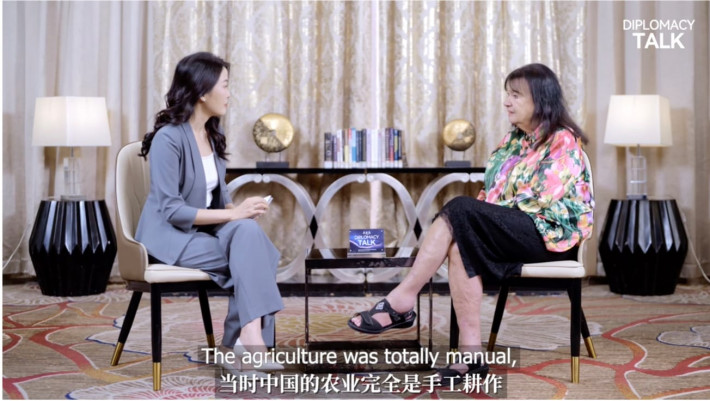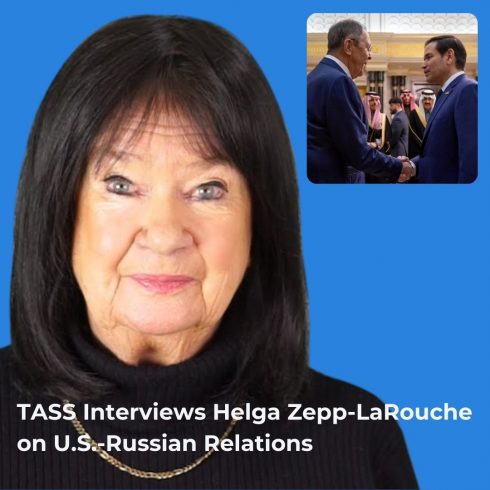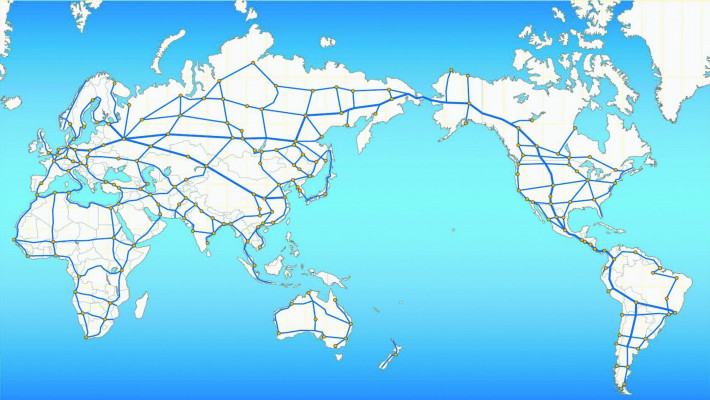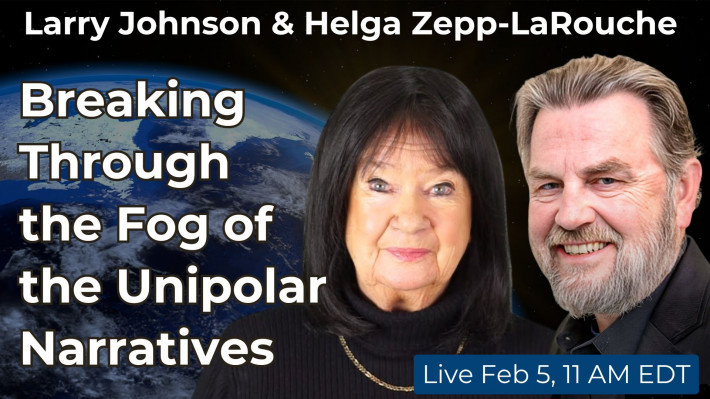Feb. 14, 2025 (EIRNS)—The following statement by Helga Zepp-LaRouche, President of the Schiller Institute, will be circulated at the Munich Security Council. EIR’s translation is by Daniel Platt
Leading military experts—especially from the U.S.A.—agree that the world has never been as close to the brink of global nuclear war as it is today. Even if the immediate danger of escalation to nuclear war over the Ukraine crisis is hopefully averted after the telephone conversation between President Trump and President Putin, this danger could erupt in Southwest Asia in the short term if President Trump does not abandon his proposal, which violates international law, to relocate all Palestinians from Gaza and even from the West Bank—or in the medium term if a “Global NATO” participates in a confrontation with China in the Pacific.
The reason for the danger of war is that after the end of the Cold War, the transatlantic establishment felt called upon to form a unipolar world government and has since then tried to eliminate governments they dislike, those that challenge the dominance of the collective West. The scandal surrounding the manipulations by USAID in over 100 countries is currently causing a stir. It turns out that the “rules-based order” works with color revolutions, regime changes, coups, corruption, etc. The cuts in the U.S.A.’s so-called “soft power” now offer the opportunity to strengthen the independence of the states previously affected and, for example, to strengthen cooperation between the states of the Global South for mutual benefit.
When the Munich Security Conference was still called the Wehrkundetagung [Defense Science Conference] and was led by real security experts such as Ewald von Kleist and Horst Teltschik, this conference was still a place for dialogue between representatives of different worldviews, as should actually be a matter of course for representatives of around 200 nations on this planet. At that time, the participants bore their own costs, apart from those for the conference venue. Since then, the Munich Security Conference has become a PR event for the military-industrial complex, where the lobby of the arms manufacturers on both sides of the Atlantic and their favorite politicians reinforce each other’s shared narratives about how the world should be interpreted and which nations are the “good guys,” the democracies, or the “bad guys,” the autocracies. Also welcome are the artificially built-up stars of color revolutions, or particularly prominent “war-ready people,” who are supposed to be the beneficiaries of a special media glamor, so that they can better prepare the population for the coming great war.
It would actually be more appropriate for those gathered here under the banner of NATO to finally subject themselves to critical self-reflection and recognize that their entire policy has failed, because it is based on false axiomatics.
• The “end of history” claimed by Francis Fukuyama after the collapse of the Soviet Union did not happen, because the rest of the world refused to adopt the model of Western liberal democracy, and instead preferred to revive its own cultures, some of which are thousands of years old.
• NATO fought a war in Afghanistan for 20 (!) years, in which the U.S.A. alone spent $2 trillion. When NATO drew the conclusion of having lost the war against 65,000 Taliban fighters, and shamefully withdrew from Kabul airport in August 2021, they left behind a country in what was then the worst humanitarian crisis. The image of “local forces” desperately clinging to the planes remains a synonym for NATO’s “success.”
• As then-NATO Secretary General Jens Stoltenberg admitted, the war in Ukraine began in 2014 and not in February 2022. The goal was to “weaken Russia” (Lloyd Austin), “ruin Russia” (Annalena Baerbock), and: “Russia must not win the war” (Olaf Scholz). Since then, NATO states have spent immense sums on armaments and training and have “put together” ever new packages of sanctions against Russia. And the result? Russia has a growth rate of around 4%—and the German economy is in free fall.
• The true character of the trans-Atlantic “elite” is nowhere more evident than in their reaction to President Trump’s initiative to start a direct dialogue with President Putin in order to finally end the lost war in Ukraine. Trump says what every reasonable person understands, namely that Russia’s security interests must be taken into account and that the war in Ukraine was the result of NATO’s Eastward expansion. The loud indignation of the war hawks on both sides of the Atlantic exposes their geopolitical intentions, which are so obviously failing miserably. This list of failed policies could go on and on.
After the “turning point” announced by Chancellor Scholz, and the associated increased military spending led to rising inflation and budget cuts in the social system, infrastructure, education, etc., Friedrich Merz’s demands for 3% and President Trump’s demands for 5% of gross domestic product for military spending now threaten that this will come entirely at the expense of pensions, health care, daycare centers, the renovation of the dilapidated infrastructure, etc. Hjalmar Schacht sends his regards: The costs of war are simply being passed on to the population through austerity measures!
We are currently experiencing total deindustrialization in Germany in favor of the profit maximation of the trans-Atlantic financial oligarchy, while over 20% of the population is threatened by poverty. If the massive militarization and rearmament now demanded is added to this, the middle class will also collapse, the welfare state will be dismantled, and Germany will become a formerly industrialized country. Germany, which was once respected and admired throughout the world, is now pitied or laughed at because it obviously does not have a government that knows how to represent its interests.
The old neoliberal order, in which Germany and the whole of Europe only had vassal status in the unipolar world order dominated by the Anglo-Americans, has failed. This represents an excellent opportunity for a new orientation that corresponds to the true interests of Germany and the other European nations. The rapid growth of the BRICS states—which already represent 22 nations and thus 46% of the world’s population, with numerous new applications for membership—shows the determination of the nations of the Global South to leave the era of 500 years of colonialism behind them, and to take their economic development into their own hands. Instead of expanding the geopolitical confrontation to the Indo-Pacific with “Global NATO,” Germany and the other European nations must seize the opportunity for our own future that lies in constructive cooperation with the BRICS states and the Global South, which makes up 85% of the world’s population.
NATO lost its raison d’être in 1991 when the Warsaw Pact was dissolved. The premise that there must always be an enemy, and that relations between nations must always be a zero-sum game, in which one wins and the other loses, is a barbaric concept that does not correspond to human nature, but only serves the profit interests of the military-industrial complex. The losers are always the poor suckers who have to lose their lives on the battlefield.
The tectonic changes in the strategic situation offer a fantastic opportunity for the European nations to work together on a new international security and development architecture that takes into account the interests of every single nation on this planet. For Germany, cooperation with the global majority offers the opportunity to get the economy back on track for growth, to help secure world peace, and to open up a positive future perspective for citizens.
What we can contribute to the further development of the human species is neither Taurus missiles nor Leopard 2 tanks, but a renaissance of classical German culture, philosophy and science by Leibniz, Bach, Beethoven, Schiller, Einstein, and Krafft Ehricke, to name just a few. The failure of the neoliberal unipolar world order presents a great opportunity to shed the imposed corset of the associated counterculture that has been imposed on Germany since the days of the CIA-funded “Congress for Cultural Freedom.”
If Germany has anything to contribute to the new emerging world order, then it is the optimistic view of humanity that is expressed in the poetry and compositions of German classical music.
No, there is a limit to the power of a tyrant. When the oppressed cannot find justice anywhere, When the burden becomes unbearable —he reaches up to heaven with courage, And brings down his eternal rights, Which hang up there, inalienable And unbreakable like the stars themselves—
Friedrich Schiller, Wilhelm Tell, Rütli Oath scene.
(zepp-larouche@eir.de)


















